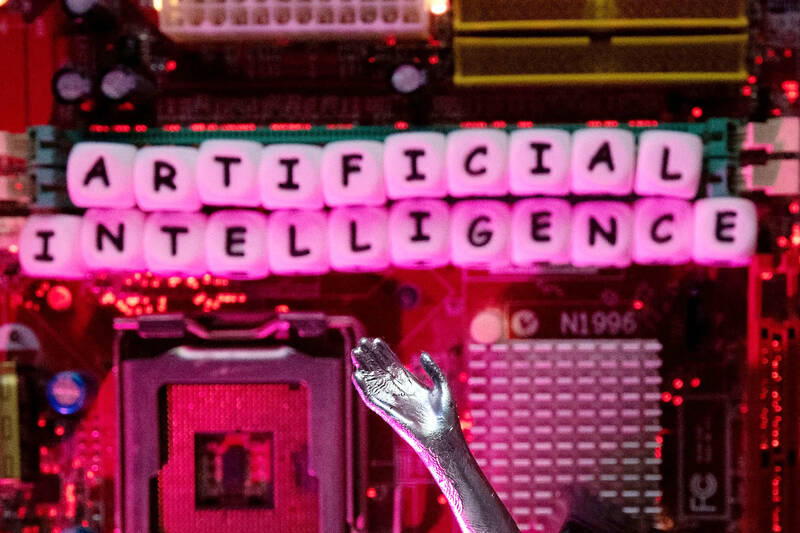MAKE AI WORK SMARTER
Asking ChatGPT to write your emails is so two years ago.
Generative AI tools are now going beyond the basic text-prompt phase. Take Google’s NotebookLM, an experimental “AI research assistant” that lets you upload not just text but also videos, links and PDFs. It will provide a summary of the content, answer questions about it, and even make a podcast-like “AI overview” if you want it to — all while organizing your original sources and notes.

Photo: Reuters
As AI tools advance, expect more features like this to be baked into everyday software. All the usual caveats of using AI apply: the responsibility for factchecking lies with you.
BREAK FREE OF THE ALGORITHM
If you’re stuck in a feedback loop of samey music or TV recommendations, go for a refresh. Some platforms, such as Netflix, let you delete your viewing history, which will help clear the slate (select “hide all” under “viewing activity” for a do-over).
Spotify is harder to crack: you’ll need to train it into offering a broader selection by diversifying your listening. Choose playlists that focus specifically on new music, or go old school and ask friends for their tips. Use the “private session” mode or select “exclude from your taste profile” to keep your guilty pleasures (or your kids’ nursery rhymes) from infecting future recommendations.
LEARN TO SPOT AI VIDEO
Manipulated videos, or “deepfakes,” might already be old hat, but you can expect to see more entirely AI-generated videos as text-to-video tools enter the mainstream.
OpenAI’s Sora and Meta’s Movie Gen are continuing to be developed, with impressive (or concerning, depending on your stance) results. Look for watermarks that show a video is AI-generated, and watch out for telltale mistakes, such as errors in anatomy or weird physics. Most importantly, use context clues: if something seems particularly shocking, unlikely, or out of place, be on guard.
LOOK UP, LOOK OUT, MAKE A BACKUP
So-called “snatch thefts” are at a high, with the equivalent of more than 200 such robberies occurring across England and Wales each day. Thieves, often on bikes or mopeds, grab phones to sell overseas. There’s not much you can do in the moment, but you can slightly soften the impact by making sure anything important on your phone is backed up. Many manufacturers offer to automatically sync all your files to a cloud service; alternatively, you can find options for specific media in the relevant phone or app settings.
TACKLE THE TECH DRAWER OF DOOM
Everyone has one: the drawer (or cupboard or box) of discarded devices, broken electronics and tangled cables hoarding valuable metals. Make this the year you reclaim the space from your unwanted e-waste. If your old stuff is in good nick, you can also try selling or donating it; remember to wipe personal data from laptops and phones by doing a factory reset or removing the hard drive.

On April 26, The Lancet published a letter from two doctors at Taichung-based China Medical University Hospital (CMUH) warning that “Taiwan’s Health Care System is on the Brink of Collapse.” The authors said that “Years of policy inaction and mismanagement of resources have led to the National Health Insurance system operating under unsustainable conditions.” The pushback was immediate. Errors in the paper were quickly identified and publicized, to discredit the authors (the hospital apologized). CNA reported that CMUH said the letter described Taiwan in 2021 as having 62 nurses per 10,000 people, when the correct number was 78 nurses per 10,000

As we live longer, our risk of cognitive impairment is increasing. How can we delay the onset of symptoms? Do we have to give up every indulgence or can small changes make a difference? We asked neurologists for tips on how to keep our brains healthy for life. TAKE CARE OF YOUR HEALTH “All of the sensible things that apply to bodily health apply to brain health,” says Suzanne O’Sullivan, a consultant in neurology at the National Hospital for Neurology and Neurosurgery in London, and the author of The Age of Diagnosis. “When you’re 20, you can get away with absolute

May 5 to May 11 What started out as friction between Taiwanese students at Taichung First High School and a Japanese head cook escalated dramatically over the first two weeks of May 1927. It began on April 30 when the cook’s wife knew that lotus starch used in that night’s dinner had rat feces in it, but failed to inform staff until the meal was already prepared. The students believed that her silence was intentional, and filed a complaint. The school’s Japanese administrators sided with the cook’s family, dismissing the students as troublemakers and clamping down on their freedoms — with

As Donald Trump’s executive order in March led to the shuttering of Voice of America (VOA) — the global broadcaster whose roots date back to the fight against Nazi propaganda — he quickly attracted support from figures not used to aligning themselves with any US administration. Trump had ordered the US Agency for Global Media, the federal agency that funds VOA and other groups promoting independent journalism overseas, to be “eliminated to the maximum extent consistent with applicable law.” The decision suddenly halted programming in 49 languages to more than 425 million people. In Moscow, Margarita Simonyan, the hardline editor-in-chief of the